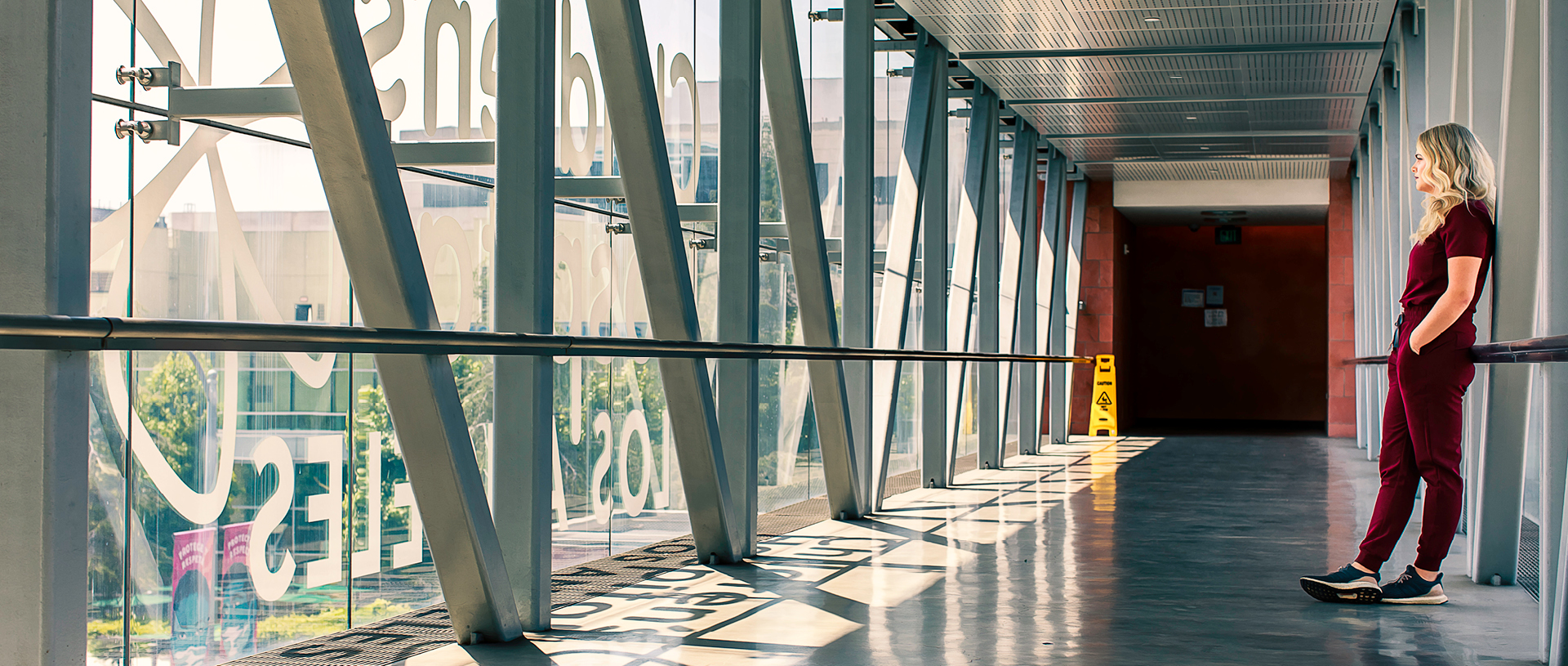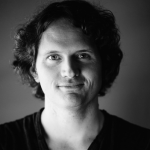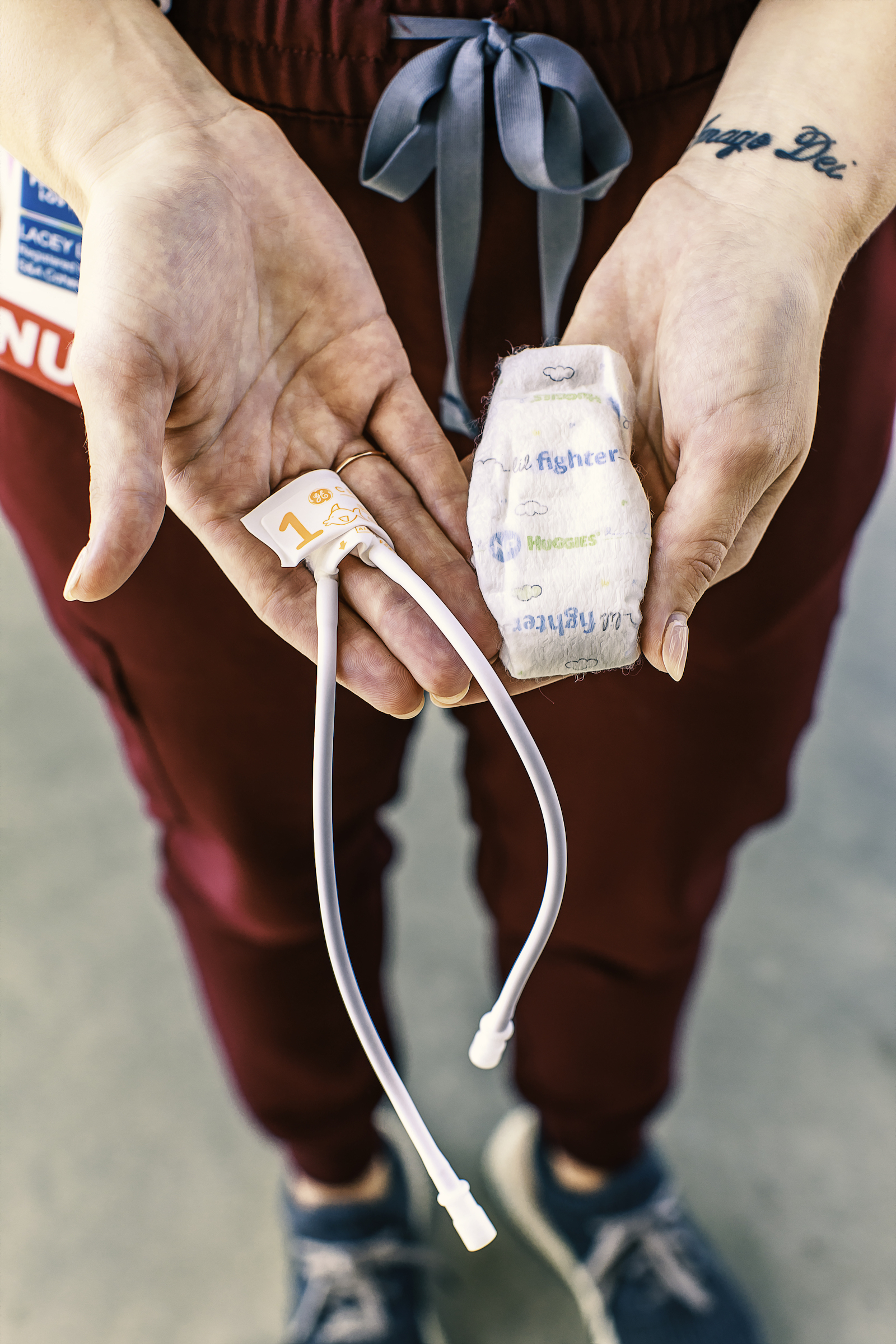
You can’t wrap up the ethics of the NICCU in a pretty package with a bow.” When asked what aspects of her work challenge her faith in God, Lacey Lanier (MAICS ’20) laughs and says, “So many of them.” She is a nurse at Children’s Hospital Los Angeles’s Newborn and Infant Critical Care Unit (NICCU), a neonatal intensive care unit (NICU) specially designed for particularly critical and complex cases. For every 12-hour shift, newborns with health problems requiring around-the-clock observation and care are entrusted to her. When Lacey scrubs in, she knows she will be caring for babies fighting for their lives. Every cuddle, every diaper changed, is a piece of her heart invested in these newborns, which deepens the ache of witnessing their pain. “I struggle with why God would let this happen. You can’t make sense of the suffering of babies.”
As a seminary student, Lacey had time to wrestle with the problem of suffering in the world, but navigating the tension of believing in God’s goodness while caring for sick babies continues to challenge her faith. Still, she strives in hope, knowing nursing is her calling—her unique way to participate in God’s ongoing restorative work in the world.
While each shift brings a variety of challenges, the COVID-19 pandemic added another level of complexity to Lacey’s already difficult work. The NICCU experienced COVID differently from other units in the hospital. There were heightened protective measures and regular testing requirements, but hardly any infants contracted COVID. The pandemic’s impact on the NICCU did mirror this aspect of society’s experience: It attacked relationships and severed connections. Tightened visitation policies reduced the number of people allowed in the NICCU. Some families chose to not visit their babies or to visit them less frequently out of precaution. Like many around the world, families decided to stay away out of love and desire to protect those most precious to them. At the beginning of the pandemic, when certain parents were not able to visit at all, Lacey struggled with burnout and knew she was in survival mode. “The unit was being as strict as they could to keep everyone safe. I had to tell myself, ‘This is for the best, this is what has to happen to keep everyone safe.’” While she was grateful for the NICCU’s precautions, Lacey felt the emotional toll of the added requirements, regulations, and restrictions. As she tried to keep her own fears and anxieties about COVID at bay, she focused on caring for the newborns the best she could.
To cope with COVID both professionally and personally, Lacey pressed into holistic care, tending to the babies’ emotional and spiritual needs in addition to their physical health. As she intentionally sought out opportunities to connect emotionally with infants, she experienced the mutuality of missional work. “Knowing that their parents have not been able to visit them, I would take extra time to cuddle with the baby. It was life-giving for both of us. We were both experiencing a lack of connection so I thought, ‘What can I do for myself and also benefit my patient?’” Emotional care impacts physical well-being. When there is a baby who is screaming and emotionally and neurologically deficient, they need to be soothed.
“Babies can actually feel your emotions, and you can help them regulate their emotions. We do that by holding them. They can feel our heartbeat, and it helps them regulate as well.” As Lacey ministered to the newborns, she found that her work, although still difficult and exhausting, was more sustainable. Holistic care is foundational to Lacey’s understanding of her nursing career as a missional vocation. But she didn’t always view nursing through this lens.

Hope Berghuis (MAT ’21) is a ballerina turned theologian and currently resides in Chicago.

Nate Harrison is a video storyteller for FULLER Studio and Senior Photographer for FULLER Magazine. His award-winning photography and filmmaking include showcased work for indiewire, The New York Times, UCDA Design Competition, and include clients such as Time Warner, Sundance Institute, and Nettwerk Music Group. His personal work can be found at NateCHarrison.com.
You can’t wrap up the ethics of the NICCU in a pretty package with a bow.” When asked what aspects of her work challenge her faith in God, Lacey Lanier (MAICS ’20) laughs and says, “So many of them.” She is a nurse at Children’s Hospital Los Angeles’s Newborn and Infant Critical Care Unit (NICCU), a neonatal intensive care unit (NICU) specially designed for particularly critical and complex cases. For every 12-hour shift, newborns with health problems requiring around-the-clock observation and care are entrusted to her. When Lacey scrubs in, she knows she will be caring for babies fighting for their lives. Every cuddle, every diaper changed, is a piece of her heart invested in these newborns, which deepens the ache of witnessing their pain. “I struggle with why God would let this happen. You can’t make sense of the suffering of babies.”
As a seminary student, Lacey had time to wrestle with the problem of suffering in the world, but navigating the tension of believing in God’s goodness while caring for sick babies continues to challenge her faith. Still, she strives in hope, knowing nursing is her calling—her unique way to participate in God’s ongoing restorative work in the world.
While each shift brings a variety of challenges, the COVID-19 pandemic added another level of complexity to Lacey’s already difficult work. The NICCU experienced COVID differently from other units in the hospital. There were heightened protective measures and regular testing requirements, but hardly any infants contracted COVID. The pandemic’s impact on the NICCU did mirror this aspect of society’s experience: It attacked relationships and severed connections. Tightened visitation policies reduced the number of people allowed in the NICCU. Some families chose to not visit their babies or to visit them less frequently out of precaution. Like many around the world, families decided to stay away out of love and desire to protect those most precious to them. At the beginning of the pandemic, when certain parents were not able to visit at all, Lacey struggled with burnout and knew she was in survival mode. “The unit was being as strict as they could to keep everyone safe. I had to tell myself, ‘This is for the best, this is what has to happen to keep everyone safe.’” While she was grateful for the NICCU’s precautions, Lacey felt the emotional toll of the added requirements, regulations, and restrictions. As she tried to keep her own fears and anxieties about COVID at bay, she focused on caring for the newborns the best she could.
To cope with COVID both professionally and personally, Lacey pressed into holistic care, tending to the babies’ emotional and spiritual needs in addition to their physical health. As she intentionally sought out opportunities to connect emotionally with infants, she experienced the mutuality of missional work. “Knowing that their parents have not been able to visit them, I would take extra time to cuddle with the baby. It was life-giving for both of us. We were both experiencing a lack of connection so I thought, ‘What can I do for myself and also benefit my patient?’” Emotional care impacts physical well-being. When there is a baby who is screaming and emotionally and neurologically deficient, they need to be soothed.
“Babies can actually feel your emotions, and you can help them regulate their emotions. We do that by holding them. They can feel our heartbeat, and it helps them regulate as well.” As Lacey ministered to the newborns, she found that her work, although still difficult and exhausting, was more sustainable. Holistic care is foundational to Lacey’s understanding of her nursing career as a missional vocation. But she didn’t always view nursing through this lens.
Hope Berghuis (MAT ’21) is a ballerina turned theologian and currently resides in Chicago.
Nate Harrison is a video storyteller for FULLER Studio and Senior Photographer for FULLER Magazine. His award-winning photography and filmmaking include showcased work for indiewire, The New York Times, UCDA Design Competition, and include clients such as Time Warner, Sundance Institute, and Nettwerk Music Group. His personal work can be found at NateCHarrison.com.


Lacey was first drawn to nursing by a fascination with the science behind how the body works. While in nursing school, her passion deepened as she had the opportunity to care for sick children. In 2016, Lacey began working as a NICU nurse in her home state of South Carolina. Although she loved the work, the environment in her unit was less than ideal. The child-to-nurse ratio was uncomfortably high, and she felt she could not provide the quality care each child deserved. While navigating an unhealthy workplace environment, she also wrestled with the spiritual significance of her work.
Lacey grew up in a faith tradition that labeled certain types of careers as more “Christian” than others. Occupations fell into a tier system, with ministry work at the top. “You can’t save the body without saving the soul,” was a saying Lacey heard tossed around frequently as she grappled with questions of theology and vocation. She internalized and interpreted this to mean nursing was not crucial kingdom work because it only attended to the body. Desiring to integrate her faith and career, she longed for meaningful work that furthered God’s ongoing redemption and restoration in the world. After many months working in the understaffed unit, Lacey hit a breaking point. Even with her deep passion for nursing, the health of her body, mind, and spirit were rapidly declining and she knew it was time to make a career change, but what? Driven by the desire to do meaningful work for God’s kingdom, Lacey decided to pursue being a full-time missionary. She knew she needed further education and training before heading into the mission field, and that led her to Fuller.
In 2017, Lacey packed up her life and moved from South Carolina to Pasadena to pursue an MA in Intercultural Studies (MAICS). The move marked what she thought was the end of her nursing career. Fuller was supposed to be a fresh start, and it was—just not in the way she anticipated. While making small talk with a classmate on the first day of orientation she explained how she used to be a nurse. The classmate immediately responded, “A nurse? That is so needed in missions!” This simple statement planted a seed in Lacey’s heart that would grow into a more expansive theology of mission.
At Fuller, Lacey came to understand that the gospel is concerned with holistic restoration and redemption for God’s people. She began deconstructing her old missiology that centered only on saving the soul. Throughout her studies, she developed a new theology of missions that affirmed bodily and emotional care as equally important to spiritual health. She came to realize how nursing was deeply important to God’s ongoing restorative work in the world. “Looking back,” she says, “it’s hard to even imagine not seeing nursing as missional work.” Lacey realized that in nursing, caring for the body, mind, and spirit could be beautifully married together. In fact, they cannot be separated. While completing her MAICS, she embarked on a year-long process of applying to be a NICCU nurse at Children’s Hospital Los Angeles. The last year of her studies, she balanced being a student with full-time work and training at the hospital.
Lacey had only been back in the nursing field for about a year when COVID hit Los Angeles. Her conviction about the importance of holistic care had already fundamentally changed the way she viewed tending to newborns in the NICCU, and this only deepened during the pandemic. “I am taking care of this baby, giving them an antibiotic that will stop the sepsis that would potentially kill them, but also, I am rocking them to sleep and caring for them in an emotional capacity. Both are important.” Especially in the midst of restricted visitation, Lacey found that even the most ordinary acts, like giving babies a bath, gave her a deep sense of connection. “When I am holding them, snuggling them, giving them a bath, that is where my heart for nursing shows in the caring. I love the science too. But I need to have that heart connection.” Opening up her heart to the babies makes bearing witness to their struggle all the more devastating. Yet she feels more certain than ever that her calling is to be a NICCU nurse. And amidst all the pain, Lacey explains, there are also moments of tremendous joy.
“One day, while clocking in, I heard my name being called from down the hall. I looked up and saw the parents of a baby I had been caring for. They were taking their child home for the very first time after spending months in the NICCU. Through quality of care, advocacy of the parents, and the collaboration of the health care team, the baby came through. Going from a place of not knowing whether the baby was going to make it to being in a place where you connect with the parents so deeply that they yell to you from down the hall—I hold on to these moments.”
As a NICCU nurse, Lacey lives in the both/and reality of our world: sorrow and joy, suffering and hope. It’s a delicate balancing act that requires her to hold on to hope while also remaining cognizant of her patients’ very real health challenges. With all the ways NICCU nursing challenges her faith, she maintains her conviction to holistic care for infants. For Lacey, connecting with the babies, knowing the reality of potential heartbreak, is what it means for her work to be missional. “I would not have these moments in any other profession. There is so much depth in the world of the NICCU—depth of sorrow and depth of joy.”
Ted Cosse, Fuller’s chief operating officer and dean of the School of Psychology & Marriage and Family Therapy, introduces this issue’s theme of what’s next for Fuller, seminary education, and the church.